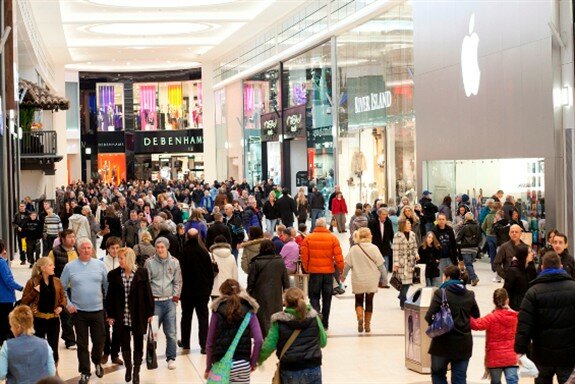
House of cards
Thursday 10 May 2012 8:00
As another retail giant stumbles while others strive to avoid extinction, Andrew Mernin asks what the future holds for the UK's High Street and whether survival options are disappearing fast.
Retailers are running out of options, read one discouraging report this week – and that was before another Hercules of the High Street stumbled into the hands of administrators.
Unlike video retailer Game’s slow and painful death, and ultimate bounce back from the brink, Clinton Card’s collapse came as a surprise to analysts. Granted, there were profit warnings and the liquidation of its Irish Birthdays chain last year, not to mention the ever increasing threat from cheaper supermarkets and emerging e-card empires like Moonpig. With the compounding factors of its annual rent bill of £80m and £100m of debts, something had to give.
But, as independent retail analyst Nick Bubb told reporters, “the question really is why the supplier hasn't been more supportive".
Leniency and patience, however, are in short supply in these difficult times and American Greetings decision to call in its £50m+ debts can hardly have come as a shock to directors at what was once the UK’s largest cards retailer.
Tenants in Clinton’s adjacent High Street lots may now be bracing themselves for the debtors death knell to arrive at their shop front. New figures this week revealed a massive 70% increase in retail administrations in the Q1 2012 – although the rise charted business failures in automotives as well as wholesale.
The ‘shops only’ figure is even worse, with a 140% quarter-to-quarter surge in administrations (from 24 to 57 in Q1 2012).
“Our own pipeline of work suggests the High Street and the many companies which service the retail industry are running out of options, with administration – the option of last resort – now inevitable for some,” said Richard Fleming, UK head of restructuring at KPMG.
One option other than the inevitable sluggish slump towards administration is diversification, as highlighted by Dixons Retail’s recent better-than-expected spike in sales.
The Currys and PC World owner this morning pointed to the impact of improved ranges and service as sales rose 8% on a like-for-like basis in the UK and Ireland in the 16 weeks to April 28.
The group’s underlying profit before tax for the year to April 28 is expected to be between £65m and £70m and near the top end of expectations, it said.
Dixons’ diversification includes its dive into the movie market this year with the launch of its home entertainment service KnowHow Movies.
Like Dixons, mobile network Three is another in the retail game capitalising on broadening its horizons. The firm plans to increase its portfolio of stores by 18% on the back of an “explosion” in demand for data.
That such young upstarts are dusting down growth plans can only be good for the job market, but what of the old guard of the High Street? What are the chances that they won’t see the year out?
If Argos isn’t yet in the danger zone, it’s certainly pretty close. The boss of the catalogue format store dismissed claims last week that the chain's business model is dying as he announced a collapse in annual profits. But shares in parent company Home Retail tumbled 14%, wiping £100m off the value of the business, after unveiling a profits fall of 60% to £102m.
Turnaround plans are afoot, though, with new managing director John Walden recently drafting in consultants OC&C to help him.
A revamped website will be launched before Christmas, while it will also be expanding its product offering, with 24,000 lines being made available in its spring/summer catalogue and an additional 9,000 online-only products.
“Argos will need a significant store closure programme as it shifts towards clicks, rather than bricks; it will need to match Amazon on price; and it will probably need a rescue rights issue to finance change,” warns Panmure Gordon analyst Philip Dorgan.
Also in the ‘embattled’ category is HMV, which operates in a sub-sector more at risk than any other from the shift of sales to online.
Positive signs emerged this morning, though, with the firm eyeing a return to the black in the current financial year.
The retailer now expects to make pre-tax profits of at least £10m, compared with the loss previously expected by analysts of £5m.
The upturn in fortunes is in part due to the problems suffered by rival Game which went into administration. Such cruel economic dynamics, which link one firm’s failure with another’s success, perhaps shows just how tough things are on the High Street at the moment.
Meanwhile, HMV has also changed the nature of its relationship with key suppliers – some of whom took equity in the retailer as part of a refinancing at the start of the year.
So there are signs that there is still life in the old dog yet, but the wider picture follows a predictably downwards movement.
The British Retail Consortium (BRC) today said British retail sales fell at their fastest rate in more than a year last month and jobs growth slowed, heightening the prospect of a third quarter of contraction and raising the chance of another cash boost from the central bank.
At stores open for at least a year, sales fell 3.3 per cent in value terms last month compared with April 2011, after a 1.3 per cent rise in March.
The figures are the weakest since March last year and are well short of forecasts for a 0.5 per cent increase.
With two major reports this week charting growing confidence among leaders in the private sector, it looks as though retailers could be the last to emerge blinking into the light and looking forward with optimism.

























